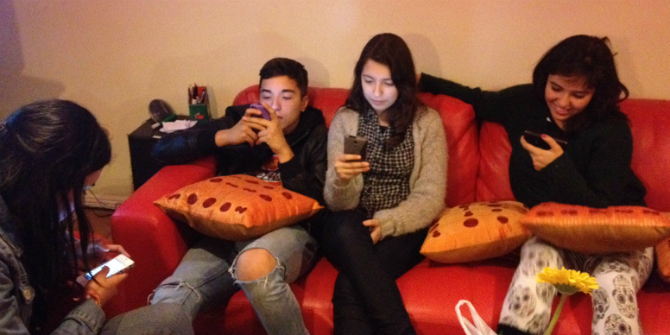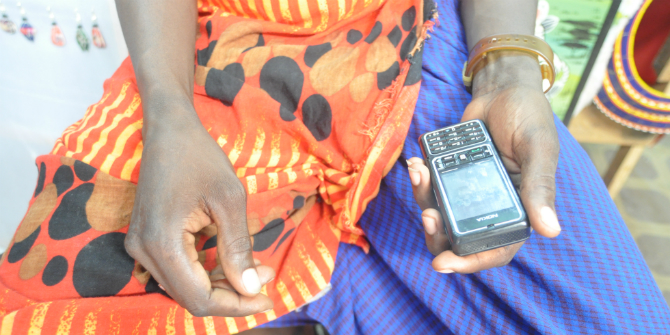 The necessity of parents working away from home has an impact on the children left behind, and many parents are using digital media to keep in touch. Nell Haynes looks at the particular case of miners in Chile and their ways of parenting from a distance. Nell is a visiting assistant professor in the Department of Anthropology at Northwestern University. She works in partnership with the Why We Post project at University College London. Her work focuses on popular culture, media, gender and race in Andean South America. [Header image copyright: Nell Haynes, used with permission]
The necessity of parents working away from home has an impact on the children left behind, and many parents are using digital media to keep in touch. Nell Haynes looks at the particular case of miners in Chile and their ways of parenting from a distance. Nell is a visiting assistant professor in the Department of Anthropology at Northwestern University. She works in partnership with the Why We Post project at University College London. Her work focuses on popular culture, media, gender and race in Andean South America. [Header image copyright: Nell Haynes, used with permission]
Many parents all over the world now use digital media to aid in parenting, but this is even more important when they are not physically present. Daniel Miller and Mirca Madianou explore this in their work on transnational families’ use of new media, but physical separation is not always a result of international migration. In northern Chile, for example, many fathers and the occasional mother are physically absent from their children due to work in the mining industry. The mines around 4–5 hours from the nearest cities, so workers stay at the mine for a full week’s shift, and can only interact with their families through social media such as Facebook, WhatsApp, and video apps such as Skype and Viber.
Luis and Alejandra: maintaining distant relations
As part of my research on social media in northern Chile, I came to understand the ways that the ubiquity of the mining industry profoundly impacts daily life, including relationships between parents and children. For 15 months I interviewed, surveyed and lived alongside local residents.
About 25% of men in northern Chile work in mining, most spending 5, 7 or 12 consecutive days working 12-hour shifts, living in dormitories at the mine. Luis is a truck driver at the mine. He leaves home every other Monday evening, kissing his fiancée Alejandra and their two children goodbye. He takes a company-chartered bus to the mine, arriving around midnight, and as soon as he is settled back into his dormitory, he sends a voice message through Whatsapp, letting Alejandra know he’s arrived. He records a bedtime message for their two children. Throughout the week, he sends voice messages wishing his family good morning, he sends pictures he’s taken when he pauses for lunch, and in the evening he uses video messages to check in with the young children, then chats with Alejandra until late, using Whatsapp. The following Monday, the last day of his shift, he is usually so excited that his Facebook wall is filled with posts.
A digital co-presence
Physically absent parents’ primary use of social media when at the mine involves what in many families would be a dinnertime conversation, asking the children what they did in school, what they have planned with friends, and checking up on their other interests. When parents cannot be physically present, digital technologies provide a form of mobile intimacy or digital co-presence, which allows for meaningful conversation. The importance of these is heightened when parents’ shifts overlap with birthdays, Christmas celebrations, or other significant family events. Exchanging pictures and recorded videos becomes central to integrating the physically absent family member in the celebration, as well as giving the children a sense that their parent is still part of this important moment in their life.
‘Performing’ absence
Physically absent family members also use social media to perform absence. The act of missing home and family are publically performed on Facebook walls through writing messages and sharing memes. Parents will often post a daily tally of the number of days on their shift and days remaining, together with a mention of what they miss, such as ‘Today 5/7 – two more days until I see my honey and little munchkins.’ Equally, their partners, and at times their children, post their desire to see the absent family member again. Indeed, Luis often posts pictures on Facebook of the mining site, which sits at high altitude, covered in snow, and captions the photos something like ‘Alejandra, I’m cold!’ in an effort to share his daily challenges and complaints with her, allowing them to overcome physical distance in order to share even the most mundane frustrations of life.
Sharing
Facebook and other social media also become sites where physically absent parents express the tensions they feel between being absent and providing for the family economically. Many men who work at the mine share memes expressing the ways in which their work positions them as the provider of resources, or the ‘family saviour’. One popular meme declares: ‘Man is not one that abandons the ship leaving his family to drift. Man is he who takes the problems on his own and his family on his shoulders and rows so the boat doesn’t go down.’ While the men often complain about their long shifts at the mine, they also speak of their jobs with great pride, and see their work as an important contribution to the family, allowing their children to have the best possible economic support and material resources.
A bridge to maintaining intimacy
Unlike parents who are physically absent due to transnational migration, parents like Luis find comfort in knowing that seeing their children is never more than 7 days away. Many say that the highlight of their job is the fact that their schedules allow them to spend a good deal of time with their families. When working 5, 7 or 12 days at a time, they are usually entitled to an equal number of free days, so rather than weekdays and weekends, life for mining families is often divided into weeks-on and weeks-off. And on their weeks-off, they are able to indulge in spending the majority of their time with their children. So in this case, social media does not necessarily replace in-person intimacy, but acts as a bridge, maintaining the bond between parent and child until physical co-presence can be re-established during time off from work.






